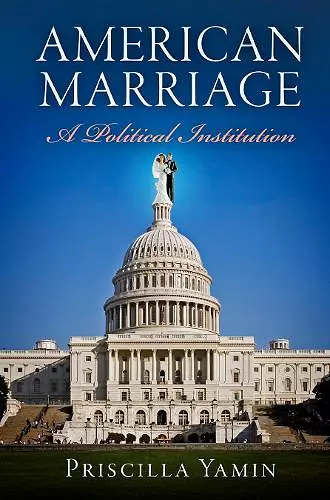American Marriage
A Political Institution
Format:Paperback
Publisher:University of Pennsylvania Press
Published:10th Apr '15
Currently unavailable, and unfortunately no date known when it will be back

As states across the country battle internally over same-sex marriage in the courts, in legislatures, and at the ballot box, activists and scholars grapple with its implications for the status of gays and lesbians and for the institution of marriage itself. Yet, the struggle over same-sex marriage is only the most recent political and public debate over marriage in the United States. What is at stake for those who want to restrict marriage and for those who seek to extend it? Why has the issue become such a national debate? These questions can be answered only by viewing marriage as a political institution as well as a religious and cultural one.
In its political dimension, marriage circumscribes both the meaning and the concrete terms of citizenship. Marriage represents communal duty, moral education, and social and civic status. Yet, at the same time, it represents individual choice, contract, liberty, and independence from the state. According to Priscilla Yamin, these opposing but interrelated sets of characteristics generate a tension between a politics of obligations on the one hand and a politics of rights on the other. To analyze this interplay, American Marriage examines the status of ex-slaves at the close of the Civil War, immigrants at the turn of the twentieth century, civil rights and women's rights in the 1960s, and welfare recipients and gays and lesbians in the contemporary period. Yamin argues that at moments when extant political and social hierarchies become unstable, political actors turn to marriage either to stave off or to promote political and social changes. Some marriages are pushed as obligatory and necessary for the good of society, while others are contested or presented as dangerous and harmful. Thus political struggles over race, gender, economic inequality, and sexuality have been articulated at key moments through the language of marital obligations and rights. Seen this way, marriage is not outside the political realm but interlocked with it in mutual evolution.
"An invitation to further and deeper conversations among scholars interested in all types of identity-based inequalities about the political institution of marriage and the politics of inclusion."—Politics and Gender
"Because Yamin, a political scientist, so astutely illustrates the hefty political work that marriage does in the face of the widespread belief that it is entirely nonpolitical, she deepens our grasp of its history."—Journal of American History
"A powerful analysis of the complex interactions between the public obligations expected of citizens and the private ones expected of marriage partners. Yamin demonstrates how our most intimate relationships have been shaped by political agendas, and in turn how our changing notion of personal rights and obligations are reshaping political debates."—Stephanie Coontz, author of Marriage, A History
"A splendid contribution to the scholarship of politics and marriage. . . . An exemplary work in a neglected field."—Anne Norton, University of Pennsylvania
ISBN: 9780812223330
Dimensions: unknown
Weight: unknown
224 pages